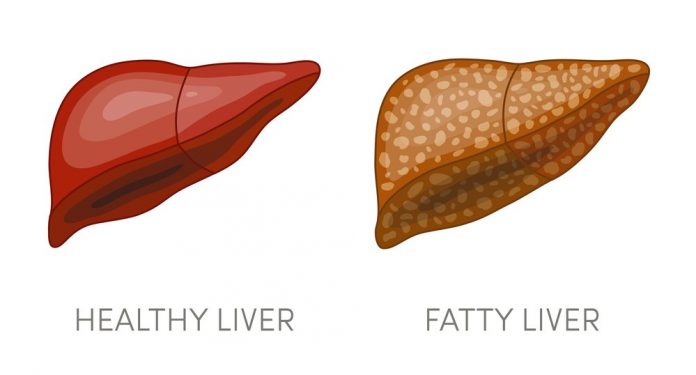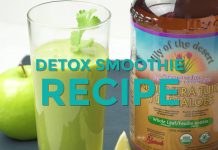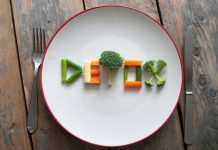
Heavy alcohol use is a common cause of fat buildup in the liver, but the same thing can happen even if you drink little to no alcohol. The result, in this case, is a condition known as non-alcoholic fatty liver disease (NAFLD), a disease unfamiliar to many people, yet it has a 25 percent prevalence worldwide. Let’s talk about NAFLD and what you need to know.
What is non-alcoholic fatty liver?
Non-alcoholic fatty liver disease is a condition in which there is an accumulation of fat in your liver. This can lead to scarring of liver tissue, known as cirrhosis. Once 5 to 10 percent of the liver’s weight is fat, the condition is defined as hepatic (liver) steatosis. The ability of the liver to function decreases as the amount of fat increases.
Read about is fat better or worse than sugar when it comes to diabetes and obesity?
NAFLD can appear in three different forms.
- Simple steatosis is the most common form and refers to fat deposits within liver cells.
- Nonalcoholic steatohepatitis (NASH), which causes inflammation and liver scar tissue.
- NASH-related cirrhosis, which can result in liver failure and require a liver transplant.
What causes non-alcoholic fatty liver disease?
The exact cause of the disease remains unknown. However, insulin resistance appears to play a role. Insulin is a hormone that helps cells take in glucose (sugar) from your blood and also helps the liver store excess glucose.
If you develop insulin resistance, it means your cells don’t take in the glucose they should, so too much fat is deposited in the liver. The result can be an inflamed liver and scarring.
Individuals who are most at risk for developing NAFLD are those who are overweight, sedentary, or who have diabetes, high cholesterol, or high triglycerides. Pregnancy, use of corticosteroids, poor nutrition, sudden weight loss, and use of certain cancer drugs are also risk factors.
Watch this video to learn more about regulating blood sugar:
How do I know if I have NAFLD?
Non-alcoholic fatty liver disease often doesn’t have any noticeable symptoms. However, when they are present, they can include:
- Pain in the upper right side of the abdomen
- Enlarged liver or spleen
- Swelling in the belly
- Yellowing of the skin and eyes (jaundice)
- Fatigue
If the disease progresses to cirrhosis, you may experience:
- Internal bleeding
- Mental confusion
- Loss of healthy liver function
- Fluid retention
Can you fix NAFLD with diet?
Diet and weight are two significant factors in NAFLD. If you are overweight, achieving a healthy weight is important. You also need to eliminate alcohol from your lifestyle.
Read about nine best foods for a healthy liver
Overall you want to reduce your unhealthy fat intake (e.g., saturated, trans fats) and lower your cholesterol. A largely plant-based diet, focusing on fresh fruits and vegetables, nuts, seeds, green tea, and whole grains, is highly recommended. Cold water fatty fish such as tuna, salmon, and herring are also recommended because of their high omega-3 content. It’s especially essential to include many foods rich in vitamins C and E, as these antioxidants help promote liver health.
Foods to avoid include sugar and sugary foods, foods high in salt, and foods high in saturated fat, such as red meat, processed meats, and dairy.
Are there other things I can do to fix it naturally?
You can try these other natural ways to prevent or manage non-alcoholic fatty liver disease. Be sure to consult your healthcare provider before taking supplements or natural remedies.
- Garlic: It’s been shown that consuming garlic can reduce fat mass in individuals with nonalcoholic fatty liver disease. In the study, participants took 400 mg of garlic powder in a supplement twice a day for 15 weeks. Another great way to consume garlic is in an Aged Garlic Extract supplement like those from Kyolic. Studies also show benefits for NAFLD in this form.
- Water: Ten to 12 glasses daily is recommended. Some research indicates that drinking hydrogen-rich water can lower fat accumulation in the liver and help with weight loss.
- Apple cider vinegar: Combine 1 tablespoon and 8 ounces of warm water and drink it every morning. Apple cider vinegar helps flush toxins from the liver and may also reduce inflammation.
- Milk thistle: The use of this herb supplement may support the production of enzymes that help the liver eliminate toxins. Always consult a knowledgeable healthcare professional before using milk thistle.
- Lemon: Research shows that lemon can reduce lipid levels and protect the liver. It’s also a potent antioxidant that can prevent damage to liver cells. Mix the juice of one-half lemon in 8 ounces of water. Add raw honey if desired. Drink the lemon water first thing in the morning daily.
- Turmeric: The curcumin in turmeric can protect liver cells when taken in recommended doses. Boil 8 ounces of water and add a pinch of turmeric. Drink warm first thing in the morning. Add a squeeze of lemon if desired.
- Cinnamon: The use of cinnamon can lower insulin resistance and levels of lipids in the body. A study found that 1.5 grams of cinnamon taken by individuals for 12 weeks reduced inflammation of the liver caused by too much alcohol consumption. Add two cinnamon sticks to 8 ounces of boiling water. Steep for 3 minutes, then strain the liquid. Serve hot and drink early in the morning.
- Flaxseeds: Investigators have found that flaxseeds can help patients with NAFLD by lowering blood lipid levels, insulin resistance, and inflammation. These seeds are also a great source of fatty acids that fight tissue damage. Take flaxseeds as a powder (great in smoothies) or whole seeds you can sprinkle on vegetables, soups, and salads.
- Tocotrienols: Tocotrienols have antioxidant and anti-inflammatory properties which may help protect against liver damage and improve liver function. A study showed reduced liver fat and improved liver function in individuals with NAFLD.
- Black Seed Oil: A review of the current evidence on N. sativa and NAFLD found that the main components of N. sativa, including thymoquinone, have antioxidant and anti-inflammatory effects that may benefit NAFLD.
How long will it take to reverse non-alcoholic fatty liver?
If you are diligent about making lifestyle changes early in the disease, you may be able to reverse liver damage. Regular follow-ups with your healthcare provider and getting liver enzyme tests done routines are important for controlling the disease.
Bottom line
Non-alcoholic fatty liver disease can be managed with lifestyle changes. Be sure to consult your healthcare professional when taking natural steps to combat this disease.










